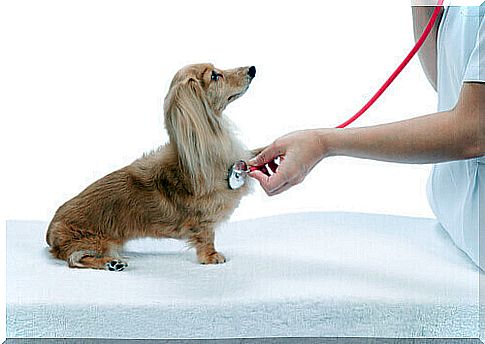Heart Problems In Dogs

Dogs also suffer from heart disease, whether congenital or acquired. About 90% of these diseases have their origin in other pathologies (viral, infectious, nutritional or tumoral).
In addition, just as it occurs with humans and due to advances in medicine, pets tend to live longer and, therefore, develop diseases that affect animals at an advanced age.
Main Signs of Heart Problems in Dogs
Heart failure is the heart’s inability to pump enough blood to tissues and organs. The causes can be diverse, but mainly they are defective valves , myocardial diseases and parasitic infestation.
It is recommended that you carefully observe your dog – especially if he is over 6 years old – to find out if he has any signs of heart disease. Amongst them:

- Fatigue during exercise, walking or playing;
- Breathing difficulty;
- Frequent cough, especially at night;
- Apathy;
- Decreased appetite;
- Fainting;
- Swelling of the abdomen.
If so, urgently seek out the veterinarian so that he can perform tests and determine the most appropriate treatment for your dog. Finding out in time the type of disease and treating it as soon as possible will help to prevent your pet’s heart from deteriorating further.
The professional will look for a way to make your four-legged friend’s breathing capacity improved, it will facilitate the normal functioning of the heart and blood circulation throughout the body, it will also eliminate excess fluid accumulated in your organs.
Major heart diseases in dogs
The main heart diseases that can develop in a dog are:
valvular heart disease
It is the most common heart disease. It occurs because of the wear and tear of the heart valves as the animal ages.
Small breed dogs – Poodle , Maltese , Yorkshire Terrier , Chihuahua , etc. – are the most affected, although in some cases they also occur in large dogs. Also, this disease affects males more than females.
The causes are not always degenerative. The valves can become inflamed as a result of bacteria that infect the mouth of small dogs.
Cardiomyopathies
They are diseases of the heart muscle itself that, when affected, produces failures in its contraction. It usually appears in large dogs, such as the São Bernardo , the Grand Dane and the Boxer .
They appear with aging, in a slow and progressive way, caused by a condition in the heart muscle that affects the beat.
Causes can be primary (usually unknown or idiopathic) or secondary to other systemic or metabolic diseases. They are usually caused by endocrine, nutritional, toxic problems, or by infections or tumors.
Congenic cardiopatics

These are defects with which the animal is born and which are usually detected before the first year of life. These are cardiovascular malformations caused by an anomaly in embryonic development and which tend to develop very rapidly evolving congestive heart failure.
Congenital heart diseases that may present, among others less common, are:
- Persistence of the ductus arteriosus;
- Persistence of the 4th right aortic arch;
- Pulmonary stenosis;
- Aortic stenosis;
- Atrial and ventricular septal defects;
- Tetralogy of Fallot.
Heartworm
It is a serious disease that mainly affects dogs, but it also affects other animals (cats, wolves, foxes) and occasionally humans.
The infection causes a disease called adult filaria, which is a round and elongated parasite that inhabits the heart and pulmonary arteries of its guests, and can measure up to 15 centimeters in the case of males and up to 40 centimeters in the case of females .
It is also known as heartworm disease. It spread quickly all over the world, although it is typical of temperate and humid zones, where mosquitoes that transmit it from one animal to another, through their bites, live.
Always keep in mind that one of the main risk factors for your pet to suffer from some type of heart disease is overweight.
If, in addition, the animal registers high levels of cholesterol and glucose, suffers from high blood pressure, the picture becomes even more complicated.
Therefore, a balanced diet and a good dose of exercise – in addition to periodic checks on your health – are essential elements to prevent heart problems in your dog.









